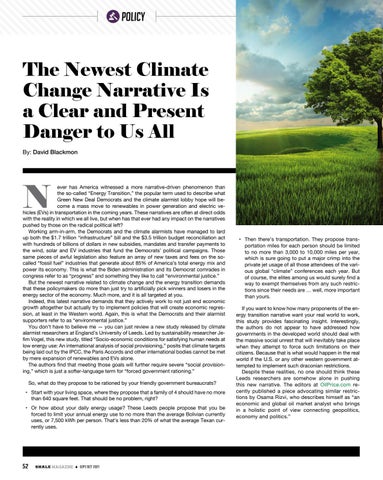POLICY
The Newest Climate Change Narrative Is a Clear and Present Danger to Us All By: David Blackmon
N
ever has America witnessed a more narrative-driven phenomenon than the so-called “Energy Transition,” the popular term used to describe what Green New Deal Democrats and the climate alarmist lobby hope will become a mass move to renewables in power generation and electric vehicles (EVs) in transportation in the coming years. These narratives are often at direct odds with the reality in which we all live, but when has that ever had any impact on the narratives pushed by those on the radical political left? Working arm-in-arm, the Democrats and the climate alarmists have managed to lard up both the $1.7 trillion “infrastructure” bill and the $3.5 trillion budget reconciliation act with hundreds of billions of dollars in new subsidies, mandates and transfer payments to the wind, solar and EV industries that fund the Democrats’ political campaigns. Those same pieces of awful legislation also feature an array of new taxes and fees on the socalled “fossil fuel” industries that generate about 85% of America’s total energy mix and power its economy. This is what the Biden administration and its Democrat comrades in congress refer to as “progress” and something they like to call “environmental justice.” But the newest narrative related to climate change and the energy transition demands that these policymakers do more than just try to artificially pick winners and losers in the energy sector of the economy. Much more, and it is all targeted at you. Indeed, this latest narrative demands that they actively work to not just end economic growth altogether but actually try to implement policies that will create economic regression, at least in the Western world. Again, this is what the Democrats and their alarmist supporters refer to as “environmental justice.” You don’t have to believe me — you can just review a new study released by climate alarmist researchers at England’s University of Leeds. Led by sustainability researcher Jefim Vogel, this new study, titled “Socio-economic conditions for satisfying human needs at low energy use: An international analysis of social provisioning,” posits that climate targets being laid out by the IPCC, the Paris Accords and other international bodies cannot be met by mere expansion of renewables and EVs alone. The authors find that meeting those goals will further require severe “social provisioning,” which is just a softer-language term for “forced government rationing.” So, what do they propose to be rationed by your friendly government bureaucrats? • Start with your living space, where they propose that a family of 4 should have no more than 640 square feet. That should be no problem, right? • Or how about your daily energy usage? These Leeds people propose that you be forced to limit your annual energy use to no more than the average Bolivian currently uses, or 7,500 kWh per person. That’s less than 20% of what the average Texan currently uses.
52
SHALE MAGAZINE SEPT/OCT 2021
• Then there’s transportation. They propose transportation miles for each person should be limited to no more than 3,000 to 10,000 miles per year, which is sure going to put a major crimp into the private jet usage of all those attendees of the various global “climate” conferences each year. But of course, the elites among us would surely find a way to exempt themselves from any such restrictions since their needs are … well, more important than yours. If you want to know how many proponents of the energy transition narrative want your real world to work, this study provides fascinating insight. Interestingly, the authors do not appear to have addressed how governments in the developed world should deal with the massive social unrest that will inevitably take place when they attempt to force such limitations on their citizens. Because that is what would happen in the real world if the U.S. or any other western government attempted to implement such draconian restrictions. Despite these realities, no one should think these Leeds researchers are somehow alone in pushing this new narrative. The editors at OilPrice.com recently published a piece advocating similar restrictions by Osama Rizvi, who describes himself as “an economic and global oil market analyst who brings in a holistic point of view connecting geopolitics, economy and politics.”














